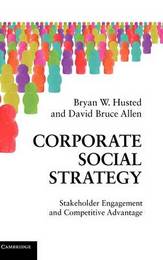
|
Corporate Social Strategy: Stakeholder Engagement and Competitive Advantage
Hardback
Main Details
| Title |
Corporate Social Strategy: Stakeholder Engagement and Competitive Advantage
|
| Authors and Contributors |
By (author) Bryan W. Husted
|
|
By (author) David Bruce Allen
|
| Physical Properties |
| Format:Hardback | | Pages:364 | | Dimensions(mm): Height 229,Width 152 |
|
| Category/Genre | Business strategy
Business ethics |
|---|
| ISBN/Barcode |
9780521197649
|
| Classifications | Dewey:658.408 |
|---|
| Audience | | Professional & Vocational | |
|---|
| Illustrations |
11 Tables, black and white; 9 Line drawings, black and white
|
|
Publishing Details |
| Publisher |
Cambridge University Press
|
| Imprint |
Cambridge University Press
|
| Publication Date |
11 November 2010 |
| Publication Country |
United Kingdom
|
Description
Can good-will be good business? Firms are increasingly called upon to address matters such as poverty and human rights violations. The demand for corporate social responsibility (CSR) is directed mainly at top management in multinational corporations who are reminded that, in addition to helping to make the world a better place, their commitment to social action will be rewarded by lasting customer loyalty and profits. But is it true that firms that engage in social action will be rewarded with a good name, competitive advantage, superior profits and corporate sustainability? What if it is true for some firms and not for others? This book addresses these and other questions by explaining the how and why of creating value and competitive advantage through corporate social action. It shows how and when firms can develop successful corporate social strategies that establish strong commitments to shareholders, employees and other stakeholders.
Author Biography
Bryan W. Husted holds the Erivan K. Haub Chair in Business and Sustainability at the Schulich School of Business, York University, Canada, and is Professor of Management at the EGADE Business School of the Tecnologico de Monterrey in Mexico. For many years, he held the Alumni Association Chair in Business Ethics and Corporate Sustainability at the Instituto de Empresa in Spain. He is currently a national researcher (level II) of the National Research System (SNI) of Mexico. David Bruce Allen is Professor of Strategy and Co-Director of the Center for Nonmarket Strategy at IE Business School in Madrid, Spain, where he served as Vice Dean for Research and Chair of the Strategy Department. Professor Allen has held top management positions in the movie, publishing, and consulting industries. He is a former Fulbright Lecturer in Spain and Resident Filmmaker at the Sundance Institute and has published fiction and criticism. He has taught at the City University of New York, Boston University, and the University of New Orleans.
Reviews'The key point in this important new book is that a corporation's 'social' strategy must be integrated with its business strategy. Husted and Allen break new ground in showing us how this integration needs to proceed. This is a terrific book for managers and theorists.' R. Edward Freeman, Olsson Professor of Business Administration and Co-Director of the Olsson Center for Applied Ethics, University of Virginia 'All companies, now more than ever, are looking for the key to being more competitive and how best to create value. Can stakeholder engagement be useful and, if so, how? This book gives brilliant answers that will help you to reinvent your business strategy from a winner's perspective.' Alberto Andreu Pinillos, Managing Director on Corporate Reputation and Corporate Responsibility, Telefonica, S. A. 'This book gives interesting insights both for academics and practitioners. Instead of addressing the usual questions on CSR and sustainability, this book begins by formulating new ones, taking the inquiry one step further while keeping in mind that scenarios for the future of corporate social strategy and strategy itself are uncertain. ... strengths of this deeply documented work are threefold: (1) a solid anchoring of ... views in CSR, stakeholder and mainstream strategic theory, (2) a variety of empirical evidence and case studies conducted over the years by the authors on which they support their views, and (3) while being profound 'believers' in CSS, they keep an eye on potential weaknesses and threats, difficulties and challenges that this idea will face both today and tomorrow.' Mar Perez, European Management Journal
|